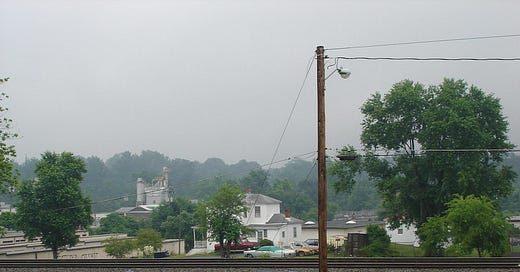Blue Ridge Nights

EMPIRE IS THE PRIVILEGE OF NOT HAVING TO THINK,
OF NOT HAVING TO WORRY,
OF UNDERSTANDING THAT —
IN SOME FUNDAMENTAL WAY —
NONE OF THIS MATTERS.
I’d never seen something written in blood before, let alone what appeared to be a full stanza with hyphens, line breaks and all. But here it was, and what was I going to do about it? I took a step back and — as if I were stepping back in a museum to look at a painting — tried to take the whole of it in again.
The text was written at an angle across dark green green wallpaper with offsetting black lines criss-crossing the entirety of the wall. A relatively modern lighting set up on the ceiling seemed to highlight the dripping slash of text while a black divan that looked like a blunt, simple signature at the bottom of a page rested underneath. And, of course, scattered across the divan, like clothes dumped out of a laundry hamper: the remains of the judge.
Sergeant David Kierney stood there beside me, arms crossed, waiting.
“Well?”
“It’s funny,” I said, leaning down to get a closer look of the body, one of my braids slipping out from behind my ear and metronomically swaying for a moment in front of my face. “I was just thinking the other day about how responsibility felt like a … dirge, like some sort of inevitable doom, you know? Whether it’s in doing the dishes while your kids are popping off or —” I gestured a hand in the direction of the body before continuing to take notes. “And now here I am with —” I gestured up at the words written on the wall. EMPIRE IS THE PRIVILEGE … “Here I am with someone who —” I stopped again to gather my thoughts but couldn’t articulate anything more than one: ‘Intent.’
“Well,” Sergeant Kierney said. “Take your time and let me know when you’re done. I’ll be outside.”
The judge’s name was Derrick Stalminella. I’d seen him with his family at Knight’s Gambit a few times over the summer — maybe once, too, on the mall — but that was the extent of our relationship. Nodding terms. Passing terms. A Charlottesville state of mind. People seemed to like him socially, and his work did not lend itself to enemies — if anything, he seemed to go out of his way over the course of his now shortened career to make himself either anonymous, amenable, or both.
I straightened myself out with a stretch and a sigh. Who would want to get rid of the lawman who was already intent on being nothing at all?



